A Day in the life...
First hand accounts from our local citizens
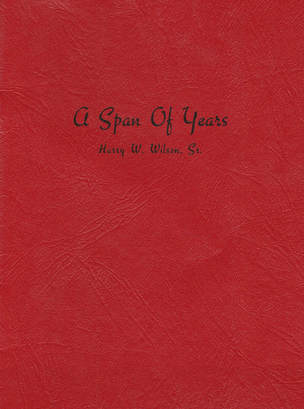 There is much to remind me of those days of an era or span of years which probably had produced more changes in the field of transportation, health , medicine, agriculture, education and many other fields than any era of its time. It this simple log of these years in any way helps my children, grand children and heirs to carry on in times of distress and or it its helps them to feel that theirs is not the only time of trouble then it will be worth writing. It is not after all what one makes but, what one keeps out of that, to be put away, against that day when he needs it. I will risk being found wrong or possibly stupid, but mrs say, unless people change, we, as a nation will not survive, in the sense of liberty and freedom, as we older ones think of it. 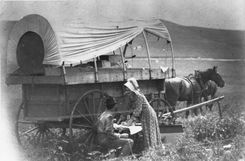 CHAPTER ONE My father, Charles D. Wilson was born in Wisconsin, and moved with his family to Miami County, Kansas as that is where he grew up. Mother, Cynthia Ann Hunt, was born in Miami County, and before she and father were married she taught school two years. After they were married, she and father moved teams and wagons to Stafford County, Kansas, where fe filed on a claim the fall before, and homesteaded for years. Father and Mother loaded the wagon and rounded up their cattle. They weren’t really giving up but knew there must be a better place to live and raise their family. After seven years of living in a sod shanty with two growing boys, they knew to make the best of their pioneer life they would make the move. Father had traded the land for 250 head of cattle, and so with mother taking care of the team and wagon, food and the boys, father driving the cattle they set out on their move back to Butler County, Kansas. Actually the trip was uneventful except the slowness and mother was going to have a new baby in a very short time. The last part of September, 1890 they arrived in Butler County and caped northeast of Benton on old McJunkin Farm. I was born in an old rented house northeast of Benton, Kansas. The folds never told me, but I am sure that with all the hardships; that all they needed was another boy. The next few years were not important to me, only another brother was added to the already growing family and what seemed like the best thing that could happen in a family of four boys, when I was ten years old, we were blessed with a little sister. Nothing could have been more important in our lives than Freda, but she was only with us for fifteen months. One day we boys were called home from school because she had taken terribly ill with Spinal Meningitis and was gone from us the next day. I thought life was over and dint think that this could happen to such a happy family. I didn’t want to go back to school, but mother said that we must and in time we would understand why these things happen. A sister Marie was added to our family in 1903. This was an added blessing after the loss of Freda. It seemed that in those days one tragic disease seemed to follow another. Diphtheria was spread throughout school from drinking from the same cup and it caused the death of six of our classmates. Modern medicine may have prevented this and then learning that drinking after everyone else might have prevented it also, bug we didn’t know these things and the doctor was sixteen miles away and not always easy for him to make the long trip out to farming communities. The next few years we boys were assuming more responsibilities, helping father on the farm. There was also time for some favorite pastimes; we skated on the ponds in the winter and went swimming in them in the summer time. At the age of 16 years, my father gave me my first gun, a rifle, which I have given to my eldest son Melvin. After finishing what is now called the eighth grade after passing the County Examination, I was only twelve and so with mothers insistence I reviewed the grade over for another two years, then I entered Wichita Business College for three years, graduation from there in 1907. During those three years, I would go home every weekend. In spite of all I did I could not forget the wonderful years of life on the farm and so I would go on the train as far as Benton and then walk the ten miles on home. Every Monday morning, my brother would take within three miles to catch the 6 A. M. train back to school and other week away from home. My mother was determined that I wouldn’t return to the land and so after graduation from college, I took a job in the bank there in Wichita. After several weeks I could stand being shut up no longer so left that job and hired on at the express office. This didn’t last too long because I was asked to work on Saturday and Sunday, so I quit and knew what I would have to go back to the country even agains my mothers wishes. I went to Oklahoma to visit with some cousins for awhile in hopes that mother would be softened up when I got back home again. It was spring and I was soft to the farm work and oats planting was in full swing. I will never forget the long days of walking behind the walking cultivator plowing in oats. There wasps much country in me that I never thought once of going back to town until, one day I went into the house and found my mother crying over the fact that I had such a determination to stay in the country. Following this episode, once again I gave in to the try at what were my parents’ wishes, and we (Father and I) went to El Dorado to talk to a former Potwin man, John Bun Adams, who was in charge of a new bank. He talked about my future and finally said he could see nothing he could offer me was a probing as what I had. I heard nothing more from the folds, guess they gave up. Some years later, the bank closed, with heavy losses to depositors, and Adams killed himself. Such is fate. 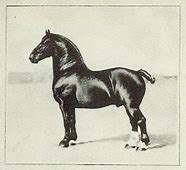 Percheron Horse Percheron Horse CHAPTER 2 Times were good and we were prosperous, as far as we boys were concerned. Cattle were bringing $5.00 per cwt., hogs $6.00. We were also raising some registered Percheron horses and would grow them to three years old. They would bring from $150.00 to $200.00 per head. I remember father once saying we had really had a fine year by making $1500.00. We had lived very well, good food to eat and the country fresh air. Suddenly I began to have girl problems. First they were minor, but as time has it way I met one I couldn’t get away from. She was as pretty as a picture and a real tease. Her daddy once told me that if I wanted to go with his girl, I had better get myself a new driving horse (I did). he had seen the one I was driving, break the shaft out of my buggy. In 1912, on December 4, Vena and I were married. Some months before we were married my father had bought us a farm, like he did for each of his sons. So after Vena and I were married, we moved in our farm near Valley Center, Kansas. We moved our entire furnishings by wagon in two loads with Vena following in the buggy. It was a cold February day and as we got ready to leave home mother once again began to cry. I supposed we were kids and were moving so far away from home. Our new home was an old house that had been moved from Wichita following the boom.It was cold and the house was dirty and the old barn was about to fall down, but being young and full of energy we went to work. The first year of our farming was 1913, one of the terrible drought years and it was hard to raise anything except a little silage which we put into a neighbors silo. The following fall we bought 30 steers borrowing the money. We had some nice brood sows which I thought would pull us through, but finally had to sell them as I didn’t hav emoney to buy the feed. Our entire capital investment for farming was a little over $1000.00 and our household furniture, stove and ect. was around $175.00. We got through that year somehow and by 1914 we did have a good crop and things began to look better. Were blessed with a healthy son, Melvin. Corn was selling $.40 bushel, wheat $.60, hogs $5.00 and cattle $7.00 to $8.00. The next two years were good ones and we were beginning to see our way clear when Vena came up with a set of twins, Evelyn and Eleine. The year ahead was the beginning of another struggle, keeping the small twins alive and Vena had a facial paralysis when the twins were seven months old which left her face drawn on one side. With time and massage, it was cured. The children were growing and once again things began to look better, but as luck will have it, tragedy struck again. This time not only were we affected, but the entire nation. World War I. 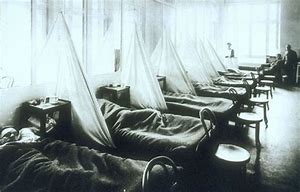 1918 Flu Pandemic 1918 Flu Pandemic CHAPTER 3 World War I brought about great changes. Boys began enlisting and then came the draft. First those without dependents and followed by those with dependents who were not contributing to the food needs. Those of us that had not been called filled in by selling war bonds. I was Class C1 and my number was to have been called in the coming month of November, but that month the Armistice was signed. I did not have any fear of going in spite of the fact that i had a wife and three children. I guess this was the affect of war psychology combined with being young. In the beginning of the war, wheat was selling for $.60 per bushel, soon it went to $2.50 a bushel when it was frozen, also, every other commodity. Food was rationed, along with other things and we all believed we should do all we could; (Save the World for Democracy). In the early part of September 1918, the terrible flu epidemic struck the already worn nation. Thousands of soldier boys were killed in camps. So great was the deaths, that no attempt was a made to care for the dead. They were stacked in tiers in the army camps. Hundreds and hundreds died from it at home, and at times burial was weeks behind in Wichita. I helped care for a friends who died from it and I came down with the flu the day before the Armistice was signed and never knew about it until several days later. Some depressions followed the war’s end and the early 1920’s began to look like they were going to be stable years. Land prices which had gone up and down broke and foreclosures were so great in Iowa and other farm states. Some foreclosures were impossible because the attempt was met by the armed resistance from neighbors, some even with pitch forks. Land went from $400.00 to $500.00 per acre down to $50.00 or $60.00 an acre. Following the end of the war, we had built a nice new house on the farm with the help of $1500.00 form my father, to whom I had finished paying all of my advances. The house cost $3500.00 and would be comparable to a $20,000.00 home of today. We had also added barn and new hay barns. Altogether we had gotten everything like we wanted it after several years of hard work. But I had never been very happy with the location of this place, although I had increased it to 240 acres. To be able to handle cattle, I knew I needed more grassland and so to meet these needs, and to quiet my unrest, I began to look around for a new location. This same year I heard that the Les W. Robison Ranch at Towanda was for sale. 300 acres at Towanda and 960 acres of grassland. I bought the paying $250.00 an acre for the Towanda Ranch and $50.00 an acre for the Stansbury grassland. 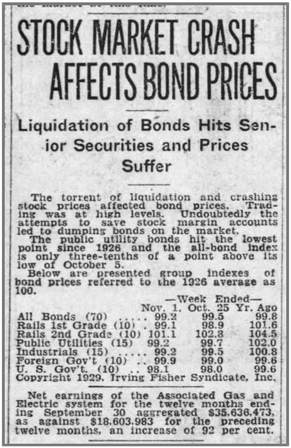 CHAPTER 4 The middle of the 1920’s was in good shape in the cattle business. Good margins and prices were on the way up. In 1926, I had gone on at the Board of Directors of the First National Bank of Towanda. A situation had occurred where the officers of the bank had been involved in a big storage of funds. being the only one familiar with bank workings, I was compelled to take over. We recovered a large part of the shortage, and unfortunately I was forced to carry on at the bank. In the meantime, the Towanda State Bank was going through a similar experience and themes in charge proposed a merger of the two banks. We did this after several months. Through a disagreement I also found myself in the new bank. This was a big mistake, both form a financial standpoint and health wise. I ran the bank through the depression and sold it in 1933. The Black Friday of November 1929 was when the bottom fell out of everything. Back in 1925 and 1926, installment buying was introduced and the public took great advantage of it. This led to higher prices, which led to more profits, ect. Suddenly business began to fall off. The stock market ad gone up, far behind the worth. Everything and everyone though the country was really on easy street, and had no compassion for the wild state of affairs, when out of the clear blue the stock market broke and kept going down, eventually breaking nearly everyone who had their resources in stocks. Skelly Oil went from $28.00 to $2.00 and that is just an idea how the big stocks were affected. Some of the weaker stocks were gone for all time. Some millionaires were left penniless, because much of the stocks were bought o margins, that is, only a small part paid for and the rest borrowed, and when that point was reached through banks or whoever was holding the stocks, they sold them to protect the loan. In the early 1930’s, cattle were a good price. Grain and oil were not affected, but as the depression worked west it took everything down. Cattle that had been bought at $14.00 in 1930 were only worth $4.00 a year later. Millions of dollars in bonds became default in the interest and many never even paid a part of the principal. Oil went from $3.00 per barrel to $.30, corn from $1.50 to $.18, and wheat from $2.00 to $.30. This was the condition of things in 1933 when Franklin D. Roosevelt was sworn in as President of the United States. Immediately he ordered the closing of all banks for a period of two days. Many of the banks were never reopened again along with the hundreds that had closed at the stock market fall. There were only three banks left in Wichita, two out of five in El Dorado and one of two in Augusta and so on through the country. Fat cattle that one year before had even selling for $15.00 to $18.00 were now only worth $5.00 and dry cows not, in many cases, pay the freight of $75 per Cwt. on them This era of Roosevelt was the beginning of a period which I am talking bout, an unsound, socialistic era, that we, as people have grown to like. CHAPTER 5 With the responsibilities of the bank, being president of the school board, councilman and or mayor, I found myself in bad health. As soon as the climax had passed, I sold the bank in 1933, and started to recover my health and finances. I had lost heavily in trying to take care of bank customers who could not make it to the cattle business and were borrowing from the bank. I did dig out with the help of an unexpected responsibility that was, more of less, forced on me and which proved to be a good thing for me both physically and financially, in the matter of the estate, or rather the guardianship, of a wealthy man who was not capable of handling his own affairs. Later I became administrator of his estate. This was great experience. I administered the estate and ran it afterward for nearly ten years along with my own business. One year after I got out of the bank, 1934, a director of the bank and friend of my father, Mr. Joseph J. Porter, was declared incompetent, and I was asked to be his guardian, and appointed by the Probate Court. He had been a very wealthy man from cattle, oil and other connections, but had lost through a lessening of his mental faculties and so called friends, quite a substantial amount of property and found his estate in bad condition. It would take a look to tell all of the experiences and trouble he was in, but through hard work, lots of law suits, settlements, etc., I was able to round up and put in good shape, a very nice estate before his death in 1936. At the time of my taking the guardianship of Mr. Porter, the country was still in the shadow of depression. His hired help had taken in some 1800 steers for grass, and that fall, none of these cattle had any equity over and above the load, so the owners did not care whether they received them or not, and I had quite a lot of trouble collecting pasture bills. The ranch in New Mexico was in the mountain mostly above 6000 feet and was mostly a sheep ranch. The Government paid for both sheep and cows and they were killed on the ranch, then hides and pelts used as counters for payment for payment. It was an odd sight seeing several hundred sheep and cows slain and in two hours nothing but the blood lelft. The negative Mexicans had taken everything for food. During 1934, 1935, 1936 and 1937, I drove some 50,000 miles each year. By now our children were growing up. Melvin was getting to be a young man and the twins were in their teenage years. In the heart of the depression, we had added another son to our already growing household. As we grew older and the responsibilities were lessened, we were able to enjoy our family. 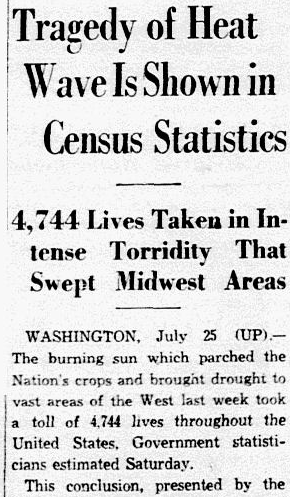 In 1935, Melvin and Margaret Wait were married, Evelyn and Elaine were away in college and Harry, Jr. was growing up. The sickness of the country as a whole seemed to be gradually healing. Prices were once again looking normal. Oil was back up to $1.25, cattle around $8.00, crops were good after some bad drought years. I can also remember along about the year 1936, we had a real hot summer with temperatures reaching as high as 118. I was in the hospital at the time and shall never forget what a hot day that was and we didn’t have air conditioning like we do today. In 1937, once again, I was appointed administrator in the Robert Hazlett Estate, a two and a half million dollar estate. We liquidated this in the next three years. Among the assets was, at the time, the finest heard of registered hereford cattle in the United States. We sold this herd at auction in 1937, in the depression era, in a three day sale for $1,325,000,00. This, also, was a wonderful experience, with less legal tangles than the Porter Estate, but much the same kind of properties. We paid the government $300,00.00 in taxes, distributing the remainder among heirs. The handling of these estates was a big help to me financially, and coming after the depression, put me back on my feet. While I was never in danger, after getting out of the bank responsibilities, of financial ruin, I was hard up. 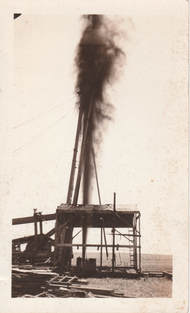 Pictured is one of the Wilson's oil rigs. Pictured is one of the Wilson's oil rigs. CHAPTER 6 With very careful living and spending through these years, Vena and I had recuperated our finances and I had my health back, settling the two estates helping financially along with other affairs. Through my experience and financial help from the estate business, and cattle had recovered some price stability, I had long wanted to get into the oil business. I had been studying the oil business from production end, so in 1929 drilled shallow wells, which I was told by what I thought to be very good authority, that they are good production wells. They were not and made no money until later years through water-flooding. I bought 140 acre lease in the Robison land from Mr. Dustin, and drilled several shallow wells, each one looking good but doing down too fast in production. I found I had invested some $16,000.00 in a project that would not prove profitable. Along g with my brother Don and Ralph Wixon, we then drilled several wells on the old home place at Potwin which were fairly good, and which we are at this date after 24 years still producing. I was thinking seriously of abandoning the lease with the shallow wells, when the man who I had bought the last from and who had adjoining acreage, and was a promoter, promoted a deep test offsetting our lease, and drilled much to his surprise and to my own, a very nice chat well. I offered an wanted my associates to go in with me and drill the offset well. They held back and I decided to go it alone. At this time, I took my family in with me, knowing that if it proved no good, I would assume the loss. Eleine and Russell Phillips had arried in 1939, and Evelyn and Charles Mitchell married in 1940. The Wilson Production Company was formed in 1942. Mrs. Reni Priest Klintworth came in with the family as a partner and also took the job of being secretary. Reni has remained as secretary and she has been much help in keeping the company on its feet. We drilled the #1 well in March, 1942 and got only alight well, but a producer and went from there to #2, which was a 200 barrel well. As there was no proration, we were able to produce 150 to 200 bels. a day, and while oil was only $150 per bbl., it got us started. At that time, it cost $20,000.00 to drill and put on the pump. A well, at this time, 1964, costs $25,000.00 to $30,000.00. Since that #1 well, we have ben very fortunate in wells, on that lease, drinking 17 and only one dry hole. It is a business that requires lots of money. Once can very easily get in bad trouble and can, also succeed. With present proration and costs as they are, it would be very difficult to duplicate this now. We, I feel, were very fortunate in this venture. As one must find oil, even though you are careful, and at the vest, has it disappointing musts. We were not without these, having drilled three wells on Melvins, one on the ranch, and one on there ranch here at Towanda, and the four producing wells on the Robison, all dry and each outing more that $10,000.00. It is not, by any standard, a get rich quick business. One reads about becoming a millionaire over night, which did happened in the old days of 10,000 or 25,000 bbl. wells and before proration and taxes, but these stories are exceptions. I can remember far more men, who thought they were rich, and died bankrupt. There is now, only a fair margin of profit, if well managed, and I double if one could start in the business now, with a limited amount of capital, and make a success of it. In the early days of the oil business, finding oil was a matter of mostly luck. Early oil men made and lost fortunes over night. Locating oil i still a gamble and drilling is tough and highly skilled and a dangerous job. Oil men call the derrick and other equipment, a rig. The derrick usually stands high depending on the depth of well. There are different methods of drilling. Our fist wells were cable-tool drilling, a simple process. Wixson Drilling drilled all the wells on the Robison, until the rig caught fire and burned down in 1950. Ralph Baker did some Cable Tool drilling for several years. Today all the drilling for the company is by Rotary Drilling. It is completed equipment but works on a simply methods. 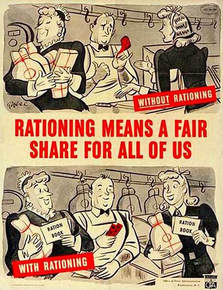 CHAPTER 7 Along about this time the world was talking about the German leader by the name of Adolf Hitler and we were plunging head long into another war. Hitler with his polity to “divide and conquer” had started invasions on Austria, Czechoslovakia, and Poland, and threatening was with Great Britain and France, and so by 1940 we were sending supplies, planes and food to England. In 1941, we sent men to Africa to aid England and in all that time the Unites States had not declared war against Germany and Italy. The awakening came in the morning of December 7, 1942 when Japan bombed our Navy Fleet at Pearl Harbor, Hawaii, killing thousands of our men and injuring hundreds. The President immediately declared war on Japan, and four days later December 11, 1941, Germany and Italy declared war on the United States. After the first shock, the country settled down to its grim task. Organized labor promised not to strike adorn war time, and the home front promised to stand behind the war effort. Enlistments were great and the draft was going fast a fast rate. The President froze prices on stocks of all kind of cars, gasoline, and food. This was regulated by the rationing of practically everything people used. The Office of Price Administration (O.P.A.) was formed and reach county was to see that the rations were on all tings which was needed for the war effort. For some unknown reason, I was chosen to fill the job of organizing and setting up the ration board for Butler County and getting it to function. This was without pay and a thankless job. People began to load up on everything they could and we immediately tried to get our organization underway. Certificates and stamps were issued and everyone had to register. We ran into many chiselers and cheats. There are always some who would do anything to get what they want. We called on different people in the county to sit on the different boards day after day and nights, to issue items to the ones qualified to get them. It was a long there and a half years and a job for everyone. Pressure was great and many of our board members could not strain and resigned. Mrs. Lucille Stansbury was my right hand helper through this ordeal and she proved to be the best person for the job. Many amusing things happened. Once for instance, I went to the office to find a large vase of flowers. I asked who had sent them and was told there were sent to the several women working on the board. I said to send them back. I could see the pitying look on their faces as they looked at me, thinking he has surely cracked up. This was done and I told them not to accept anything that would seem to serve as a bribe form anyone. The girls found this was the beginning of the game of bribing, or shall we say, buttering up, that some people used. This order saved much embarrassment in the months to follow. We had fine men and women on the O.P.A Board and it the sin any way, helped to win the way, then it was worth all the cost and worry, and worth the three and a half years I put into a thankless, payless job, but a lesson in life. 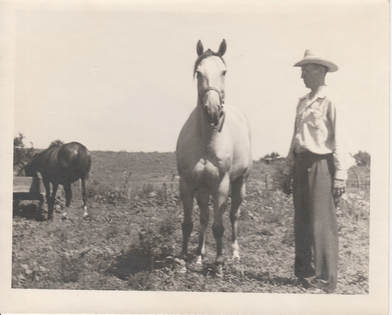 Harry Wilson, Sr with one of his quarter horses. Harry Wilson, Sr with one of his quarter horses. CHAPTER 8 Back in the last thirties, when I was making rips concerning the Porter Estate, buying cattle and other business, I traveled a great deal in Texas. On the trips I began to ovbserve a type of horse that seemed to be used in the cattle business. It was called the Quarter-Horse, so called because of their great speed at distances up to a quarter of a mile. Cowboys used them to cut out cattle form their herds. These horses seemed the greatest breed of horse flesh I had ever seen. The Quarter Horse can start, stop, and turn instantly at the slightest movement from the reins They also seem more surefooted than other horses. In 1942, during the war, I made a trip to Texas and both several mare Quarter Horses, and later I went back and purchased a Stallion. There was no registration of these horses at this time and very little interest, except on the noted King Ranch in South Texas and the Underwood Ranch in Wichita Falls, Texas. A word as to the starting of this program, It was started as a sort of hobby. I have never seemed to have time for things bordering on anything not having to do with strict business. I bought a family of horses from a ranch in West Texas. The sire of these mares was Yellow Wolf bred Stallion, (Big Jaws), and that had been foaled on the Waggoner Ranch and became badly crippled by wire. He was sold to this ranch from which I bought him. He had proved himself many times and I was happy to buy several of his daughters. I later added to the mares in different breeds. In 1943, I went to the Kind Ranch in South Texas, long noted for their horses, both Quarter and Thoroughbred, and as they had never sold any stock, through rather special invitation, I bought a colt whose Sire was one of their her sire, Sor-Mack. I brought him home as a yearling and raised and broke him. He proved to be a good working horse and a very good sire. The next several years we bred, raised, and broke man fine horses. But as all things seem to go, everyone got into the business, with a great deal of promotion, double dealing in the raising end of it. Rather than go on , decided to reduce the program. It had, as I said, started as a pleasure and had run into a business. I did not feel I was happy to go on with it. We retained a number of our best horses and have some yet. After it grew, I need a man who could break and train, as Harry, Jr, was till young, although, a fine horseman and rider. I employed Marshall Hoy, one of the best. He was with us several years and Junior sort of grew up under him. When we cut down, we found him (Hoy) a place at the ranch and when he left we sold and fave to him many nice horses of which he still has some. I night add, as I formerly said, there were no registration son these horses, but soon there was a Registration Book started and to be registered the horse has to have his breeding established, also, meet with very rigid conformation. All our horses met their requirements and all were registered. In recent years, through breeding, the quality of his breed was been improved. Also, far too many have been produced, which has flooded the market, as to their need. Now many are crossing they good breed with thoroughbred stallions to produce a short distance race horse. I fear, all too soon, the real Quarter horse will become so mixed with his hot blood, that he will no longer be the cool, intelligent, almost human, horse he is now. The demand for good horses lessened and rather the raise, train and sell them at less than cost, we gradually quit raising them. CHAPTER 9
In 1950, Harry, Jr. and Ann Page were married and Junior came into the ranching and cattle business with me. I have an uncontrollable love for the land, grass, and cattle and it seems I have never gotten it out of my system. Although, as of now, with high costs of operating, high taxes, and as always uncertain prices for cattle, the most of our young people are leaving the land for other fields. Some for a lack of love for it, some for a lack of financing. With it all, over a lifetime, considering the great amount of planning, work, and disappointments, for that young man, who has ability and is ambitious, there is not finer life, that with livestock and farming. But, I got off my subject, as I started to tell about some of the era’s cattle business and land and grass world. In coming back to Towanda, it was coming back to the land and grass I was born into. One has to change the types of cattle as the demands change. Although, I have done this, in various degrees, I have pretty much felt that the good quality cattle, considering their growth, ect., were our safest bet. For a time, in the 1930’s, I had a very nice cow herd, and although, well managed, did not seem to fit in, with all its problems. Some years later, the demand for a cheap grade of beef, put us to handling what we called grain steers, mostly Brahma, three of four years old. One year, my brother Don and I shipped a trainload of 1000 head of Brahma steers from South Texas. For several years, this type of cattle were good for us. The consumer demand changed, people demanded better beef and today one could not sell this type of cattle to the packer. The cattle business, very much like the oil business, is a way of life, and if one cannot take disappointments, it is not for him. Good land, good cattle, good grass, and good men, make a combination that succeeds. To my way of thinking, the new method of buying and selling at auction, has led to a situation ichi is not good. It lacks the professional touch that is so necessary in the buying, in particular, and has brought about a condition, which had led to a great deal of very unsound buying methods, along with many questionable practices in the auction way. I would ope that the losses suffered during the pas few years will bring back to us the old and tried methods, but I doubt it. After coming to Towanda, we farmed all the land here, mostly with horses and mules. We had lots of hired help coming and going, in haying, silo filling, ect., but would mention two men who were with me for years and became almost a part of our lives, Tom Nace and Bill Morris. Along with them, Tom’s boys, who were left motherless when the youngest was 5, and who grew up on the ranch, all helping as they grew up. Lyman, alone, remains with us and has been at the ranch some 25 years. Those were hard years, floods, good and bad crops, before the advent of modern tools, and during the span between 1920 and 1935 lots of our people lost out and gave up. We stayed always with the crops that could be put through cattle, always feeling that if we took care of them and the land, that they would take care of us. In the early 1920’s, we acquired a brand for our cattle and described and known as the Seven-L-7L. In the 1940’s, a very loose law was passed in our state requiring every head of cattle to be branded, but offering nothing in the way of protection and inspection at the public markets. We (some of our neighbors and I) were attempting to get the law strengthened. While awaiting results, a small operator, passing by our barns where the brand was, asked the state to register it as his brand, unknown to us, and its as granted. We tried and failed to buy his rights out, and had to change our brand to JJ, a double J. In looking back, which I seldom do and do not like to, there are many things I would not do again, and many things I did not do, that I would do. I do not valiance we are given the fist of foresight, which I doubt would ve a gift, but that we must do the vest we know to do, and hope that is right. I believe I will dedicate the few following facts and memories to my grandchildren, a grand lot, not with any thought that they might be too interested, but with the feeling that somewhere, sometimes, in this fast changing time, when a time comes that makes it difficult to go on, they will read or have read the history in this, and feel that these may have been times as difficult to face as their problem, and that it will, in some way, help them over the rough spots.
1 Comment
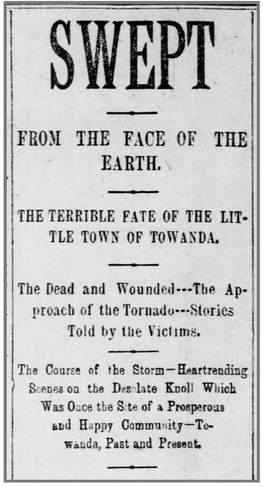 The accounts of the victims following the aftermath of the tornado on March 31, 1892 as told by the Wichita Daily Eagle, published on April 2, 1892. "Thursday night at about half-past 9, I was called by Mr. Sorter, in whose hotel I was staying, to save myself." These were the words of Miss Ella Thornton of Towanda yesterday to a reporter for the Eagle. "He cried for me to get out of the house and I could feel it lifting and quivering. I ran to the north door and threw it open, and then I must say I passed through an experience that is the strangest of my life. My hand had scarcely flung the door back when I was caught up and wafted into the air like a feather; for a moment I was queered by the suddenness of the whirl, but I soon recovered sufficiently to see that I was burned upward by a irresistible force, amid a shower of boards, planks, chairs and household articles that I could easily distinguish in the flashes of the continuous lightning. My body was sometimes horizontal, sometimes my feet were up and sometimes my head. After what seemed to me an eternity, I saw a white object near me which proved to be a large pillow. This I threw both arms around, hoping that if I ever descended, it would help to break my fall. Soon, I was dropped head foremost; struck something, and that was all. Afterwards, they told me that it was a horse I fell upon. You see, I am not hurt badly. My neck is a little stiff. I was carried through the air two blocks. The little town of Towanda yesterday presented the appearance of having been swept by the gigantic besom of some ferocious monster. But a few houses were left standing, and these showed the dire effects of the terrible storm. Everywhere were strewn the boards of the once happy homes and the household articles and decorations, which served to make them attractive and dear to their occupants. The site of the town was not covered with heaps of debris of fallen buildings; it was worse than that, it was "swept." Everything was flat on the ground. For miles beyond the town in the track of the storm articles and boards were picked up. THE DEAD In one of the few remaining buildings which was until yesterday the local restaurant, on a few hard weather-beaten, blackened plants, lay three long suggestive forms, covered rudely with coarse blankets. The dead are: Herschel Cupp, 21 years, incision in the back of the head. James Bailey, 21 years, strangulation. John Blake's baby, 6 months, head severed from body. Mr. J.D. Godfrey, 78 years, injured internally. Albert Barnes, Age 22, crushed by timbers. The first of these, Herschel Cupp, a son of a prominent man, was pending the evening at the house of Mr. Kerr, when the storm struck. He must have got out into the street and was felled there. His body was picked up a thousand feet away in a ravine. His face showed numerous wounds and bruises. The corpse of James Bailey had a horrible appearance and every feature was indicative of the horrible agony of his death. Bailey was a section hand in the employ of the Missouri pacific and was staying at the National Hotel. When his body was extricated from the ruins, it was found that he had fallen head foremost in a feather mattress and had smothered to death. He was an exemplary citizen. Bailiey's parents live in Guthrie. Mr. and Mrs. John Blake's 6-month old baby met a ghastly death. It was decapitated. Early Friday morning the baby's head was picked up, but the body could nowhere be found. Finally it was picked up three hundred yards from where the head was found. The mystery to all is what cut the baby's head off. The guillotine never did a neater piece of work. Surgeons present said that the best master of the scalpel in the world could not have made a neater incision. In the temporary morgue the head and body were laid together and a very narrow ribbon tied about the baby throat would have entirely concealed the fatal would, and for all appearances, the little child might have been only asleep. The parents of the infant were among the wounded. Dr. J. D. Godfrey was a retired physician of Towanda. He was an old man and liked by every one. He was invalid and was in bed when the raging blast struck his little home and wiped it from the face of the earth. He was picked up in the street bleeding at the lungs and died in a few hours. Even in the community that has been stricken to heavily, the loss of Dr. Godfrey is felt with particular keenness by his old friends and neighbors. Albert Barnes, the fifth dead man lived on the John Kibby farm, eight miles south west of Towanda. Barnes was formally of Wichita. His house completely collapsed and the grinding timbers crushed the breath and life out of him. THE HURT AND WOUNDED The few houses that stood the strain of the wind were at once turned into hospitals. There are five of three places, and they were all crowded. Two in every bed and lying on blankets on the floor. They were some potable scenes; but the poor creatures were only too glad to have the doctors dress their wounds for the little relief it afforded them. Over in one corner on an improvised cot of two chairs, laid a little baby with its leg broken in two places; crying with its terrible pain; on the floor lay a little boy with his skull crushed in on his brain, smiling bravely a the doctor's anxiety for his relief; on the bed, a woman in the full bloom of life, with a hole through her lungs and another her stomach. Everywhere pictures of misery and resignation. The doctors say several cannot live. The list of the wounded contains: Miss Annie Robbins, 35 years old, compound fracture of high arm, perforating wood under the collar bone piercing the lungs, bowls also pierced; may die. Miss Robbins was postmistress. Miss. Fern Maxwell, 8 years, fracture of the skull; will probably die. C.L. Wescote, 78 years, coal dealer, two scalp wounds, contusion of the back, bleeding at the lungs. Some hopes. Miss Lucy Poorbaugh, 25 years, hips crushed, crippled for life. Mrs. Hall's baby, leg fractured. M.H. Gibbs, three ribs broken. Effie Keer, gash in the head. Mrs. Cary, three ribs fractured. Mrs. Walter Mooney, fractured clavicle. Walter Mooney, gash in the side; scalp wound. Eddie Mooney, scalp wound. Mrs. J.P. Keer, back and shoulder bruised; injured internally, will probably die. Elmer Hall, badly bruised about the head. Mrs. George Cornelius, three ribs broken. William Mitchell, hurt internally. Mrs. William Mitchell, collar bone broken; injured in back of head. Sherwin Cupp, bruised about the head. Mrs. Sorter, badly burned and hurt internally. Mrs. Chanelle, badly bruised. Mrs. Blake, internally injured. Harry Roach, two ribs broken. Mrs. Harry Roach, burnt and injured about the head. Mr. and Mrs. Tedow and aged couple, both badly hurt. Will Hagen, hurt on the side. Mr. T.W. Sorter, shoulder crushed. Scores of others were injured. Nearly every man, woman and child in the little town received a bruise of some kind and black eyes and bandaged heads were a common sight in the solemn little group that stood on the corner of what was once Main street and talked over their terrible trouble in lowered voices. There was another peculiarity about the condition of the wounded which would appear strange to one who hadn't not hear other action of the elements. Most of the wounded are covered from head to foot with mud, and this, getting into the woulds, increased the aggravation of the suffering, until the medical corps could arrive. Dr. Russell, the only practicing physician in Towanda, was in the country with a patient at the time of the storm. Doctors Siegler, McGinnis, Koogler, Armstrong and Hunt of El Dorado, arrived about midnight from El Dorado. Yesterday morning they were reinforced by Doctors Van Nuys, McClees, Purdue, L. J. Jones, St. John, Minnick, Wilson and Taylor, who responded to the call from Mayor Carey, and were carried over to the scene of the disaster in Superintendent Russell Harding's special car, which he kindly tendered. Most of the wounded are in their night clothes; only a few have on their every day dress, and most of the citizens who are unhurt are but scantily robed and in case of change to colder weather would no doubt bring much suffering. Nearly all personal property is destroyed or blown out of sight and the town will undoubtedly need aid and that quickly. HOW THE STORM CAME Most of the citizens of Towanda had gone to bed at the time. A steady gale was blowing from the south, but as that is not unusual at this time of the year, no great fear was felt by most of the inhabitants and many retired with no thought of how close, death and destruction were lurking. At 9:30 those who were up an awake, noticed that the wind all at once lulled and there was perfect quiet. Two or three old-timers knew the sign and went to their cellars. Then there was a distant roar, increasing every moment and coming nearer. Down it came growling whistling, roaring wild. "It sounded just like a sawmill," said one man. Telegraph poles were twisted out of the ground, the depot was lifted and carried eighteen feet and dropped. Farther up the town houses were lifted, twisted, crushed and blown away. Everybody in the storm agree on their point: the houses were picked up, then twisted and then crushed like cockie shells. The storm struck Towanda from the southwest, and went straight through the town. The greatest force of the storm seems to have been on the northwest part of town, as every house in that portion of the village is completely demolished and the remaining few which stood the tempest beat were in the southeast portion. The creamery was saved because it was full of ice. Granaries with corn on the ear withstood the gale well, but yellow piles of grain in the other places showed all that was left of granaries. There are probably seventy-five or eighty buildings in Towanda, there are only a dozen left standing and they are in badly dilapidated condition. Main street, which was the business thoreughfare of the town has on each side two rows of frame business building totally destroyed. The site of the livery stable is only marked by a pile of broken buggies and a dead horse or two in the pile of broken and split timber. The office of the Towanda Herald was shown to have once existed by the conglomeration of type, a hand-press, a Bible and a few agricultural reports. An organ which had, by some strange freak, stayed into a print-shop, was also scattered about among the ruins. The forge of Andy Johnson's blacksmith shop, as that of Jim Reid's, is the only indication that they ever existed. A little farther down the street, an office is literally turned upside down and remains in that position. The lumber yard is only a memory, and a stranger would never suspect that is was ever such, as there is not a board in sight. The fence posts were twisted out of the ground here and two thrashing machines were turned upside down, their wheels sticking up in the air. A residence near this is entirely swept away and the maple trees, of good size, stripped of every limb and twig. Two hotels present the very worst appearance. The are both two story buildings. Once was called the National and was run by Mr. and Mrs. Hager. It was here that James Bailey was killed and Miss Poorbaugh wounded. The house was a complete wreck. The other is the Towanda House and was run by J. M. Sorter. The Towanda House was build over twenty years ago an dis one of the oldest frame buildings in the southwest. It, also, is totally destroyed. Between this and the school house in the extreme northeastern portion of Towanda, not one house is left standing. Every fence, barn, tree, is leveled. It is a singular fact, said to be characteristic of tornadoes, that the corner of the school house, in the direction of the storm, is uninjured while the opposite corner, away from the storm, is shattered badly, so much so in fact that the whole building has fallen in before this probably. The house is a large four room brick, two story building and in a heavy loss. The whole town is almost a total loss; there being some fire insurance but with one exception, no cyclone policies. The exception is $1,000 on the National Hotel. The village church is a total wreck. THE FIRST NEWS The first news of the disaster was received at El Dorado and an engine with medical relief was at once dispatched. An engine came over to Wichita and the station agent notified Mr. A. H. Webb of the Missouri Pacific who immediately repaired to the scene. "It was terrible," said Mr. Webb to the Eagle reporter, "The town was in ruins. The rain and hail came down in torrents. Women were running about the streets in their bare feet and nightgowns; lost children, all but naked, wandering about crying for help and those missing were thought to be dead and this was cause for fresh grief. Its was a scene of the wildest and most heart rendering confusion. I have never seen anything like it, and I can tell you I never want to again." The hail was larger at Towanda than Wichita and the rain came down in sheets. Every flue in town was down and no fires could be built, and neither the bed clothing , which was wet, could be dried or the wounded who were soaked could be warmed. Its as indeed a precarious outlook. J. M. Sorter, proprietor of the Towanda House, had a thrilling experience. He is a stalwart man of 62 and his story to the Eagle man: I feared trouble and was sitting up; when I heard the roar, I ran to my granddaughters' room and seized one of the 14 years, the other of 12, under each arm and rushed for the door. I felt the hotel raised up, twisted and then it went to pieces like a castle of cards. When I extricated myself from the rubbish, I found that my shoulder was crushed. I still had the two girls and seeing by the lighting that only thing about that was not moving was a refrigerator, I put them behind it, and covered them with a blanket to protect them from the rain and hail, which was dreadful. Just then I hear my wife calling me. She had just gained consciousness, and by digging in the rubbish I soon discovered that she was pinned down by the red hot stove!" "Hurry," she said, "for goodness' sake, hurry! Its burning me!" "I grasped a board and pried on the stove, but I didn't not have a fulcrum, and I was crazy with my wife's appeals for help. Finally, good fortune sent a box along, which I used as a fulcrum and got my wife out. I was nearly overcome myself now, and my shoulder was paining badly. I was just fixing up a shelter for my wife when I hear a voice calling me as if it were in the distance. I listened and discovered that it was away down in the ruins of the hotel. I went to work again and dug down to where M. H. Biggs, one of my lodgers, was pinned down by a fallen ceiling. I pried this up an asked him if it relieved him. He said no, and to hurry - the he could not breathe two minutes longer I then discovered that there was another ceiling was bearing on him. When I got this away, he felt relieved at once and I soon had him out. It was awful - awful - awful," added Mr. Sorter, "and the long wait through the night in the hail and rain was not the least terrible part of it." OTHER STORIES "My wife and I were still up when the storm struck, " said E. E. Hall. "I was undressing one of the children preparatory to putting them to bed, when the house collapsed. I grabbed two of the children and, strange to relate, that is all I know, until I found myself at the neighbors in another part of town, still holding the babies and my wife still with me. I have been told that I went to Mrs. James' house, my wife following with the other child. I positively have no recollection of this. Neither has my wife. All these wounds on my head I remember nothing of. Mrs. James said the we both looked dazed and she took us to Mrs. Nance's. An hour or two later, I came to. I absolutely knew nothing all this time. I cannot understand it. How could I carry those children and keep my feet in an unconscious condition? The baby I carried had its leg broken; oh it is terrible, terrible." "My wife," said E. G. Thornton, "was sitting on the edge of the bed undressing the baby, when we suddenly felt the house lifted, twisted and turned over. The next thing I knew, we were all sprawled out in the mud, the rain and hail and flying missiles increasing to our periled discomfiture." James Porter, the well-known stockman of Towanda, had gone to bed. His wife and daughter with him. The first thing he knew the roof of his house went off, followed by the second story. He tried to go down stairs but found the way blockaded. He finally was thrown off with Mrs. Porter and the daughter, but they all escaped unhurt. Mr. Porter is especially happy that he did not go to the cellar as he intended; as the foundation of the house caved in and that would have meant certain death. THE TRACK OF THE STORM
The storm has been traced. It probably started five miles east of Wichita, destroying Mr. Winder's place. Its course is shown southwest of Towanda by the demolition of the farm houses and barns of George Sneider, Ed Corbin, John Anderson, Peter Seitergreen and Johnny Hammon. The twister struck Towanda from the southeast, and a few feet beyond the school house, turned and went north. This is shown by the fact that the hay stack a few hundred yards northeast of the school house was untouched. The storm continued on its fearful journey six miles directly north, playing with the houses of J. E. Jarton, A Leimann, Colonel Crabtree, A.J. and J. K Ralston and Banker Gillespie's barn. Six miles north of Towanda the storm turned east and struck DeGraff, a small station north of El Dorado. At the time of the storm at Towanda, the suction of the air resulting, caused the wind to blow violently from the east at El Dorado and from the west at Benton, the storm making a vortex. HISTORY OF TOWANDA Towanda is the oldest town in this part of the country. It was founded by Isaac Mooney in 1856. Mr. Mooney still resides in Towanda and his house was truck by lightning but not otherwise injured in Thursday nights storm. For some years, J. R. Mead of this city had an Indian trading post at Towanda and it was the headquarters of the great southwest. At the time of its destruction it probably had 200 to 250 people. It is now doubtful that is till ever be rebuilt, and may become a mere flag station, where hitherto, it has been a very prosperous village. "It as just twenty-one year ago this 17th of June," said an old settler at Towanda, yesterday that "this country was visited by a similar storm and El Dorado suffered greatly." As told by Valla Wilson Hind: Opal Rae ‘Cupp’ Hummel was born February 8, 1916 to Nettie (Imhoff) and Marvin Bert Cupp. Opal was the granddaughter of one of Towanda's first settlers, Daniel H. Cupp. Opal came to work for my grandparents, Harry W. and Vena Wilson in the mid 1940’s. They owned the beautiful majestic home at 121 N 2nd Street in Towanda, Kansas, along with several hundred acres to the north and west, all the way to the Whitewater River. They raised Quarter Horses and Cattle. Opal had two children, a set of twins, Gene and Joyce, born in 1935. She and the twins settled into the small “Garage” house on the west high, just across the street to the east from my grandparents. The “garage” house had belonged to Otis and Evelyn Nace. They had built the garage first and lived in it until they could get the rest of the house built. However, that did not happen as they ended up taking job in Pampa, Texas and moved. The house was cozy but had an outdoor privy with a chain pull toilet. By the time I was born (1951), there had been an indoor toilet and shower installed. Opal cooked and cleaned for my grandparents, but she was also considered one of the family and so were her children, Jean and Joyce. The twins were only a few years younger than my dad, Harry Wilson, Jr., who was the youngest of the Wilson children, born 1931. When Grandmas and Harry, Jr. were away, Opal looked after my dad and made sure he was staying out of mischief. A near to impossible task, I’m sure! Some of my fondest memories as a child were seeing my grandparents several times a week and getting to sample Opal’s sugar cookies with red hots. She would bake once a week and fill a large red tin in the pantry with ginger snaps and sugar cookies. Being a ranching family, people were always dropping by, so the cookie tin was always kept filled to the brim. Grandkids knew where it was kept in the pantry and were always welcome anytime to the cookies, but the limit was three. Opal was also known for her wonderful chicken and dumplings and chicken and noodles. I would try to sneak a sample of her raw noodles only to be told to, “scoot”, and remind me “those noodles are for Sunday dinner!” 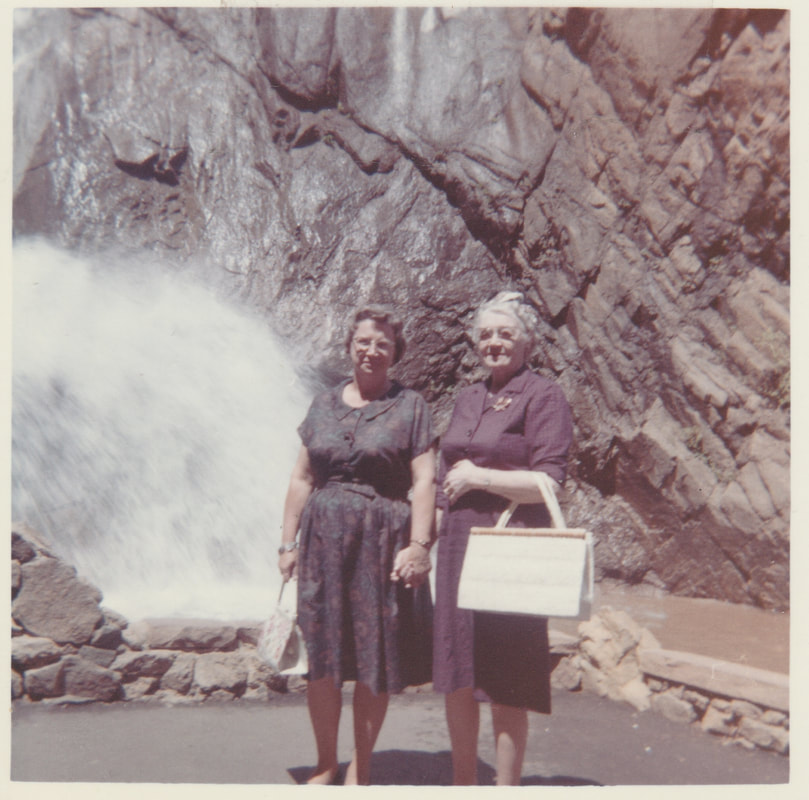 Opal 'Cupp' Hummel with Vena Wilson Opal 'Cupp' Hummel with Vena Wilson She was often invited along on trips with my Grandparents and family get togethers like the 4th of July picnics. We all always enjoyed her company! Embroidery and cross-stitch was another wonderful skill Opal had. You were a very lucky girl to be presented with a set of her hand embroidered tea towels or pillows as a wedding or shower gift. On hote summer afternoons, I can remember visiting with her and my grandmother as they relaxed in the sitting room of the big house and worked on their sewing projects. Grandmother with her quilt pieces and Opal with her embroidery. This is where I learned to sew. The would insist it was too hot to be out tiding my horse, and so coerced me into learning needle work. I’m glad they did! Opal was very involved with her own children and grandchildren, as well as, being very close to her sister Millie, who lived in Wichita. She also loved collecting cup and saucer sets and miniature souvenir spoons from various states.
Opal was like another daughter to my grandparents as she was the same age as my dads older twin sisters, Eleine and Evelyn, born in 1916 and only two years younger than his older brother Melvin, born in 1914. My grandfather was aways teasing Opal and would catch her when both her hands were in dish water and jerk her aprons strings as he rushed past her. She always took the teasing well, and would laugh. Opal suddenly became ill in 1972. Grandmother drover her to the hospital, where she died a short time later of heart failure. She was only 56 years old. Needless to say, we were all in shock! As I stood at her gravesite during the funeral, I began to reminisces about my childhood days of getting to see her almost daily and the impact she had on my life, as well as, my siblings and cousins. She had lived to see me grown and married of which I am grateful. I still miss her to this day. Especially, when I am trying a new recipe and it is not coming out like it was intended. I stop and think to myself, “What would Opal do to make this taste just right?” - Valla Wilson Hind 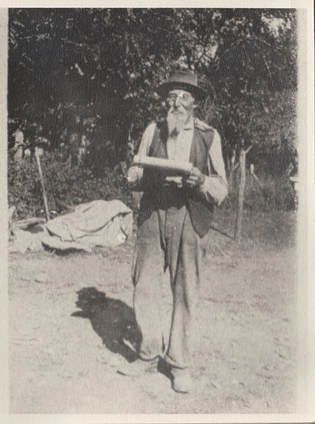 Daniel H. Cupp, first settler of Towanda. Daniel H. Cupp, first settler of Towanda. There heve been several stories about the early days of Towanda and they all seem to vary a little as to the others, but one thing they all seem to agree about is Daniel Cupp being the first white settler to settle in this area along the Whitewater River. This is a story as told to the “Towanda News” by Daniel H. Cupp in the year 1916. This article was copied from the early newspaper by Hank Burchard. All of these newspapers will be available for review in the near future at the Museum. ____________________________________________________________________________________ “You should have been here in 1859 and 1860, as I was, if you think this is a dry hot time,” said pioneer D.H. Cupp to several who were discussing the discomforts and crop failures of the existing drought. Upon request of those present for the story of that time, Mr. Cupp said it was in December, 1859 that it stopped raining entirely. “The year I cam here, arriving on the Whitewater in the spring. There were several light rains in April and one or two during the summer, but none to do much good to what little crops that had been planted - - corn, potatoes, and garden truck. A little of which was harvested that fall, but not enough to feed the people. Bread stuffs were hauled in by wagon from Leavenworth. This, with meat, of which there was an abundance, such as buffalo, deer, antelope, wild turkey, prairie chickens, quail, which would be had for the killing, afforded everyone plenty to eat and aided the settlers to live through the following winter very comfortable. Our stock lived on the range had plenty of feed and came through in good condition. Cattle were fat enough for beef. Up to this time, with the exception of one light snow in January, no moisture had fallen. So ever, were went ahead an put in our crops, trusting providence for rain. But this time it disappointed us. A long, hot, dry fall, until the September when rain came, but too late to do any good. There was absolutely nothing raised and no surplus left from the preceding year, so we were up against it. Grass was but two to three inches high and could not be cut for hay. I and a neighbor, at one time during the summer noticed a little rain cloud down in the direction of Dry Creek and decided to try for hay there. We found a patch of grass about a foot high, which we mowed and raked by hand, getting seven loads for our work. No one lived near there; but wild cats and panthers were there, lots of them and they howled and screeched around our camp all night. We paid them no attention and they did not bother us further than that. 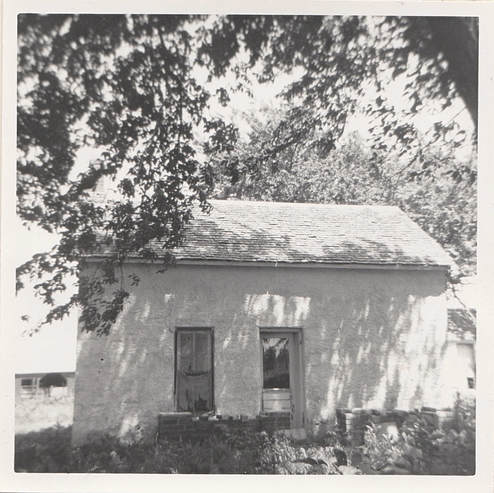 Cupp House Cupp House The few people that lived on the Whitewater and Walnut were in the stock business - raising cattle chiefly, and some horses and ponies. They did not put up much feed for the winter and stock lived on the range year round and the grass too short and cured on the ground was excellent feed and the stock lived through the winter in good shape with little care from the owner. At that time we thought this never would be anything but cattle country. We did not believe the uplands could grow anything except grass. The settlers along the streams discouraged immigrants all they could, telling them that they would starve to death; that there was no timber they could get, as it was all taken, and no railroads and no markets which they could reach with farm products other than cattle, and that there never would be. This policy had its effect. Settlers did not come until the latter part of the sixties. After this the country rapidly filled up and the range cattle business was coming to be a thing of the past. 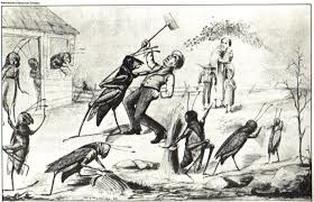 The next dry spell of any note was in 1867. There would have been a little corn, but for the grasshoppers which came in September. The corn was just beginning to harden and hoppers going in to the fields ate it clean, leaving only the bare stalks. Again the people were without anything to eat but meat, and wild game was not so plentiful as it had been, but there were still plenty of cattle. Teams went to Leavenworth for supplies. The drought had extended over all the west and provisions were hard to get and prices were high. Corn meal was $10.00 per hundred, flour $15.00, sugar 25 cents per pound, and coffee 75 cents. Money was scarce and many families went without groceries and some of the time without bread. One feature of the time (a marked contrast with the present) was the hospitable and social condition existing among the people. Everybody was made welcome in their homes and all were equal. No one considered himself better than his neighbor. Their interests were in common. Those in trouble were aided; the sick were given care, selfishness and rivalry were unknown, as was the “back biting” and scandal. These came with the civilizations and progression of the present. 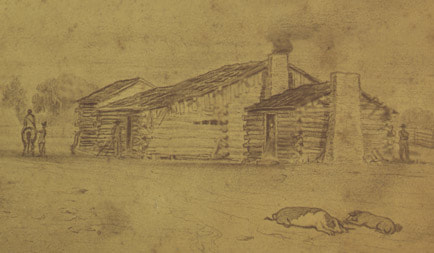 Meads trading post Meads trading post The beginning of Towanda at its present site was the building of a log house at the foot of the hill near the spring by C.L. Chandler, a forty-niner returning from California in 1858. This after-ward was sold with his claim to James R. Mead and used as an Indian trading post. A post office was established and mail carried by “buckboard” twice a month from Topeka. I was the first post master and this office received mail for all living west to the Colorado line. The first town platted on the Whitewater was by a party of men from Topeka in 1856, on the west side of the river near my home. They dug and walled a large cellar over which a log house designed for trading post, was built. Upon discovering pearls in the Whitewater, the town builders became pearl fishers. Wading in the stream gave them malaria. The pearls having proved worthless, they abandoned this country, never returning. The log building, following the failure was used as a “town house” several years for public meetings, and for the first school taught here. It was finally torn down. The settlers lived in log houses, usually of one room and often with no floor other than the ground. They were as a rule, situated near the creeks with small fenced fields adjoining.
Occasionally there were religious meetings held at the settlers homes, but more often it was a dance and other social gatherings. People from the Walnut always attended these Whitewater events. The question of dress did not concern the ladies. Calico was a popular dress material. And often the men were more elaborately clothed then the women. Bandana handkerchiefs adorned their hats and arms, and the revolver and belt was always in evidence. Horse racing was a popular amusement. However, little money changed hands at the races. In fact, there was little money in the country, and the people were not addicted to gambling. For years, there was only one doctor in the country. He lived on the Walnut and attended the sick all over Butler County." MY TRIP TO CHICAGO "On account of my Shorthorn steer LOCHDHU LINDY winning First Prize at Championship in the Shorthorn Division of the 4-H Club show a the Kansas National Live Stock Show at Wichita in November 1927, I was awarded a trip to Chicago by the Rock Island Railroad. We left Wichita at 9:15 in the morning and arrived in Kansas City at 4:15 in the afternoon. Several other boys and girls who belonged to the 4-H Clubs in Kansas and who had been awarded free trips to Chicago were also in the train. When we arrived at the Union Station in Kansas City we were met by Miss Bender who had charge of the club Boys and Girls. We got our suppers in the Union Station and left Kansas City for Chicago at 5:45 in a special sleeping car attached to the regular Rock Island train, arriving at Chicago the next morning at 8:15. We left the train at the La Salle Street Station and walked to the La Salle Hotel which was our headquarters while in Chicago. After checking in, we were taken for a bus ride along Michigan Boulevard which is the longest street in Chicago and follows the shore of Lake Michigan for several miles. After coming back to the Hotel, we cleaned up for supper. Mr. Coe, who was charge of the Club work in Kansas took we boys and girls to a cafe about a block from the Hotel. After we had finished our supper we went back to the Hotel for the balance of the evening. The next morning we went out to the International Live Stock Show and saw the fine stock that was on exhibition there. In the afternoon we were entertained at the Horse Show. On Monday we went to the Wilson Packing Company, by invitation from Mr. Wilson, and were given our suppers there and entertained for a couple of hours, then back to our Hotel on the elevated Railway. On Tuesday morning w were invited to the Armour Packing Company, where they gave us our breakfast and entertained us for about and hour. We were then shown through the packing plant. In the afternoon we were taken to the Field Museum where we spent a very enjoyable afternoon looking at the mounted animals and other things they had there. It was a grand place and would take more than one day to see it all. From the Field Museum we took taxis back to our hotel, got supper there and spent the evening in the Hotel. Wednesday morning we went to the Argo Corn Starch Factory at Argo, Illinois. Also went to the International Harvester Co. and saw them making tractors, stationary engines and other kinds of machinery. There are almost every nationality of people working in this factory. The manager of the plant took Mr. Coe, Mr. Clapp and Mr. Gibson down the line where all the different nationalities of the world almost were working in the factory assembling tractors. As they passed each man, the manager would speak to them in their language and they would answer him, but we could not understand anything they said. We went back to Lincoln Park in Chicago and saw the many kinds of animals and birds they have there and watched the keepers feed and care for them. Lincoln Park is very fine and contains several hundred acres. From Lincoln Park we went back to our Hotel. Friday morning we went back to the Museum and from there we went across the street and saw the second largest stadium in the world. It is called Soldiers Field Stadium. This is where the University of Southern California and Notre Dame University played football on Thanksgiving Day this year. We went from there back to the La Salle Hotel, packed our grips and left on the Rock Island for Kansas City. We arrived at Kansas city the next morning on time and left at 10:25 for Wichita, arriving at Wichita at 6:00 P.M. It was a grand trip and I enjoyed it very much. I thank the Rock Island Railroad Company for giving me the trip." This story was written by JC Robison, JR following his journey to Chicago in November 1927. JC Robison, JR was the son of James Robison, creator of the Whitewater Falls Stock Farm Barn. |
Archives
January 2024
Categories |